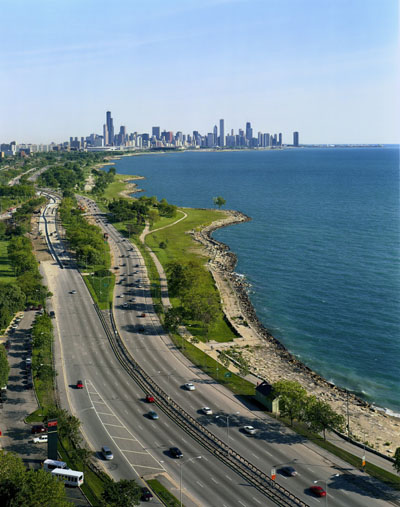In the face of water shortage concerns prompted by a growing population, climate change, and federal regulations, Illinois still lacks a statewide framework for managing water resources. “Beyond Showerheads and Sprinklers,” a May 16 conference, will spark dialogue about the complex governance decisions necessary to manage Illinois’ future water supply.
Illinois’ population is growing, and with it the demand for clean water for
residents, businesses and agriculture. Our auspicious location adjacent to the
world’s largest freshwater source, the Great Lakes, belies the fact that
Illinois is already nearing the federally designated legal limit on how much
water it can tap from Lake Michigan. Climate change experts predict warmer,
rainier weather for the Midwest, worsening Illinois’ tendency toward draught and
flooding. Meanwhile, urban areas experiencing water shortages, such as Houston
and Atlanta, offer cautionary tales about the need to plan for water.

Despite all this - and an
executive order in 2006 calling for a statewide
framework for regional water supply planning - Illinois has yet to develop a
plan for managing its shared water resources.
To help inform the creation of such a plan, the Metropolitan Planning Council, Openlands, and the Paul Simon Public Policy Institute, with
support from the Joyce Foundation and Lumpkin Family Foundation, present
the May 16 conference "Beyond
Showerheads and Sprinklers: Water Governance Solutions for Illinois." The
agenda is available online.
The conference will feature local perspectives and global experts on water
conservation, demand reduction, future use constraints, and governance.
Sen. Richard Durbin (D-Ill.) and Chicago Mayor Richard Daley have been invited
to speak on the importance and timeliness of water supply planning in Illinois
and metropolitan Chicago.
Keynote speaker Peter Gleick, president of the Pacific Institute for Studies in Development,
Environment and Security and author of the biennial report "The World's Water," is an internationally recognized water expert on connections between
water and human health, impacts of climate change, sustainable water use,
privatization and globalization, and conflicts over water resources. The
full
agenda
includes additional speakers
from around the country.
State and local officials, water authorities, conservation organizations,
water companies and utilities, municipal water officials, agricultural and
industrial water users, planners, and wastewater and stormwater management
professionals are all encouraged to attend.
The conference is Friday, May 16, from 8 a.m. to 4 p.m., at the Union League
Club of Chicago, 65 W. Jackson Blvd. An early registration fee of $45 (before
April 15) covers food and beverage throughout the conference. After April 15,
registration costs $50; the deadline to register is May 12. Online
registration is available .
For additional information contact Josh Ellis, MPC, at (312)863-6045 or jellis@metroplanning.org; or Lenore
Beyer-Clow, Openlands at (312)863-6264 or lbeyer-clow@openlands.org .
For more information about this issue, download Changing
Course and Troubled
Waters , two reports that made the case that Illinois needs a statewide
framework for regional water supply planning.